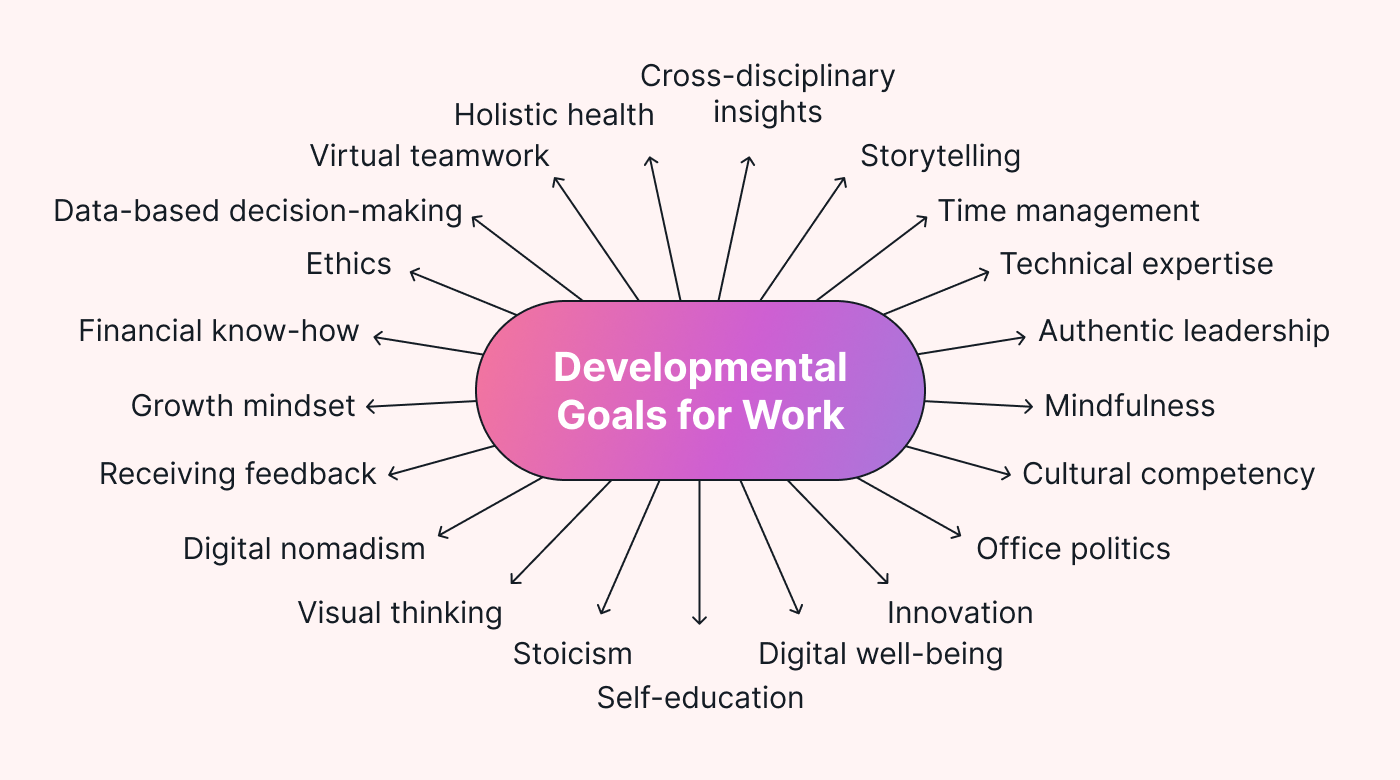If you’re feeling professionally stagnant, you’re not alone. Many professionals hit a plateau in their careers and start to wonder what’s next.
But don’t worry — this doesn’t mean that your growth is over. You just need a little spark to continue your evolution.
That’s why we’ve put together this comprehensive list of truly helpful, inventive examples of developmental goals for work.
These goals are anything but run-of-the-mill. They’ll kickstart your career with actionable advice for mastering new skills, propelling you into the future.
What developmental goals for work really are — and what they aren’t
Professional development goals are personal milestones that guide our future growth.
Rooted in our aspirations and values, they go beyond everyday tasks to mold us into the professionals we strive to be.
 |
Developmental goals for work are all about:
- Evolving
- Learning
- Expanding your horizons
They don’t just address what a role currently needs. They sharpen skills that are vital to long-term career growth.
For example, completing a project by its deadline would be a poor example of a developmental goal. On the other hand, taking a project management course to improve your workflow and efficiency would be a good example.
What developmental goals for work are not
Career development goals aren’t your typical to-do lists. And they’re not just about climbing the corporate ladder, either.
They’re also not about:
- Task completion
- Hitting sales targets and meeting short-term objectives
- Reaching goals specific to one project
These goals dive deeper into areas that lead to genuine professional evolution.
The benefits of developmental goals for work
Investing time into developmental goals can yield long-lasting rewards. And we don’t just mean promotions or raises — we mean profound personal growth that makes your workdays more fulfilling, too.
Connecting to professional goals increases your:
- Job satisfaction
- Enthusiasm for your career
- Overall well-being
Developmental goals can also help diversify your skills, making you more adaptable to industry shifts and, ultimately, keeping you competitive in the job market.
Setting professional goals is an investment in yourself. It means career longevity and a strong sense of professional purpose.
21 developmental goals for work: Examples and inspiration
We know there’s no formulaic path to development. And we also know that conventional, vague advice won’t get you anywhere.
 |
That’s why we’ve brought together many actionable ideas that can be turned into developmental goals to keep you motivated and expand your work horizons. We’re sure you’ll find something that’ll spark growth.
1. Enhance your communication through storytelling
Storytelling is a powerful tool for conveying complex ideas in relatable ways. So, take your messaging to the next level by mastering the art of the narrative.
To hone this communication skill, start by learning from the best. Pixar offers a free course called “The Art of Storytelling” at Khan Academy.
Or, pick up Made to Stick by Chip and Dan Heath, which provides concrete strategies for creating memorable messages. After you get some inspiration, practice crafting your own stories.
2. Go outside the box with time management
If simple to-do lists and deadlines aren’t cutting it, optimize your productivity through a blend of unconventional time management skills.
The ultradian rhythm technique is rooted in our natural bodily cycles, which ebb and flow every 90 minutes. Align tasks with these cycles for peak productivity.
Or try out the “Two-Day Rule,” where you never skip any task or habit for more than two days in a row.
3. Expand your technical expertise in emerging areas
Dive into futuristic domains, like quantum computing, which is reshaping our digital world.
For example, check out IBM’s Qiskit, a free platform that offers tutorials on quantum programming.
Or, for a beginner-friendly but deep-diving online course, try edX’s “Applied Quantum Computing: Fundamentals.”
Other areas to pursue knowledge include the following:
- Virtual reality
- Augmented reality
- Neural networks
- Blockchain
4. Nurture authentic leadership
Engage in experiences that cultivate your leadership skills.
For a structured approach, consider enrolling in a course. There are quality, affordable options on Coursera and Udemy on the topic of authentic leadership.
You can also engage in mentorship — either as a mentee or mentor — to witness authentic leadership in practice and polish your own approach along the way.
Consider starting by journaling your values, strengths, and weaknesses. Reflect on any constructive feedback you’ve received and how it aligns with your self-perception.
5. Foster your emotional intelligence through mindfulness
Mindfulness lets you experience the present moment fully, without judgment or distraction. Leverage it to increase your empathy and improve your relationships.
Apps like Headspace or Calm are great beginner mindfulness tools that offer guided meditation sessions. Alternatively, a great book on the connection between mindfulness and emotional intelligence is Search Inside Yourself by Chade-Meng Tan. Inside it are many action-oriented exercises for improving your mindfulness.
Lastly, practice mindful, active listening in conversations. Do this by focusing entirely on understanding the speaker without preparing a response in your head while they’re still speaking.
6. Cultivate cultural competency
Understanding diverse cultures is always helpful in our increasingly globalized world. When it comes to your career, you’ll be better able to navigate cultural dynamics if you have this knowledge.
Consider taking a simple course, like “Developing Cross-Cultural Intelligence” on LinkedIn Learning.
Another option is to attend cultural events or join multicultural clubs in your community to give you real-world insights.
Even streaming platforms have a broad range of international content. Immersing yourself in international films or literature is yet another way to expand your awareness.
7. Strategically navigate office politics
Interpersonal dynamics can be tricky, but conflict, even if rare, is part of any work environment. Agents of conflict resolution, then, are powerful assets for any company.
 |
Begin by reading the book Crucial Conversations: Tools for Talking When Stakes Are High. It offers tangible strategies for mastering challenging conversations.
Additionally, use feedback tools to anonymously collect and address concerns.
8. Ignite innovative thinking
Lateral thinking is the backbone of innovation. Challenge yours with puzzles and brainteasers, such as those found in Edward de Bono’s Lateral Thinking: Creativity Step by Step.
To immerse yourself further, attend workshops or seminars on innovation, like those offered on IDEO U.
Finally, engage with industries or topics outside of your expertise to foster a cross-pollination of ideas.
9. Harness digital well-being
Maintaining a balance between technology use and mental health is essential today.
Check out Digital Minimalism by Cal Newport for a comprehensive guide on achieving this balance.
Set digital boundaries using apps that limit screen time. Declutter your digital life.
Integrate regular “tech-free” hours into your day, focusing on activities that rejuvenate you.
10. Self-educate continuously
Continuous learning keeps you at the forefront of your industry.
Start by subscribing to relevant industry journals or magazines. Platforms like MasterClass allow you to learn directly from industry leaders across many fields.
Set aside dedicated learning hours each week, or find an industry mentor who can guide you toward the right resources for your discipline.
11. Integrate Stoicism for resilience
Recently, there’s been a renewed interest in Stoicism, an ancient philosophy. That’s because Stoicism offers timeless techniques for mental fortitude.
Ryan Holiday’s The Obstacle Is the Way is a good place to start.
Write down your daily reflections in a journal, or try challenging yourself with regular discomfort exercises, such as cold showers or fasting. These activities can help cultivate mental strength and adaptability to challenging situations.
12. Use visual thinking to improve your problem-solving skills
Humans are a visual species. Use this to your advantage by transforming complex problems into straightforward visuals.
Start by learning basic sketchnote techniques from Mike Rohde’s The Sketchnote Handbook. Attend workshops or webinars that teach mind mapping and how to create infographics.
Platforms like Lucidchart allow you to create visual representations of intricate problems.
13. Embrace digital nomadism in remote work
Fuse your personal goals with productivity by doing a stint in digital nomadism. This is a unique experience that’ll inspire and educate you.
 |
You can either research digital nomad hotspots, like Bali or Chiang Mai, or find your own location.
Digital nomad platforms detail specifics such as cost, connectivity, and community for numerous destinations. There are also a number of resources available to help you find remote-friendly workspaces wherever you go.
14. Master the art of feedback
Unlock your potential and amplify team dynamics by mastering feedback.
Begin by reading Radical Candor by Kim Scott to understand the nuances of giving and receiving feedback. Practice structured feedback sessions within your team, ensuring they’re both frequent and constructive.
When delivered effectively, feedback can help you with:
- Professional growth
- Communication gaps
- Team cohesion
15. Develop a growth mindset
Carol Dweck of Stanford teaches about growth vs. fixed mindsets. These principles allow you to grow into new skills and roles while managing your expectations throughout the process. Apply them for a growth-focused mindset.
Challenge yourself daily by setting tasks that are slightly beyond your comfort zone. Reflect on failures as not negative outcomes but learning experiences. Join online growth mindset communities or forums to get support from others interested in the domain.
16. Financial know-how for non-financial roles
Financial literacy is helpful to any professional. Learn more about financial topics and behavioral economics.
A classic to start with is The Richest Man in Babylon by George S. Clason. Many modern podcasts can help you stay updated on global financial happenings.
This knowledge will help with:
- Decision-making skills
- Project management
- Business strategy
17. Become an ethical advocate
Championing ethical behavior is becoming standard in today’s business world. Spearhead ethical practices and awareness in your field.
 |
Familiarize yourself with the ethical guidelines of your industry. Learn from leaders who are already pushing the envelope.
Subscribe to Ethical Corporation for regular updates on global ethical business practices. Attend webinars or workshops on ethics in business. Consider obtaining an online ethics certification to learn more and bolster your credibility. Cornell and Harvard Business School both have options.
18. Harness data in your decision-making
The more data-literate you are, the more you’ll be able to use the power of data-driven decision-making in future roles.
Data-driven decisions will only become more prominent over time. Begin your data journey with online courses like “Data-Driven Decision Making” on edX.
Explore tools like Tableau or Power BI for visual insights into datasets. Join data science forums for peer discussions, or find workshops that explore professional skills around data analytics.
19. Elevate your virtual teamwork skills
With the new norm of hybrid workplaces, mastering remote collaboration is no longer optional.
Dive into specialized courses on Coursera to gain deeper insights into effective online collaboration.
Additionally, join communities that focus on advanced strategies and best practices. Proficiency in remote collaboration not only streamlines your workflow but also positions you as a key player in the evolving digital workspace.
20. Holistic health for peak performance
Your well-being directly impacts your professional life. Take time to improve your health for optimal performance at work.
All the standards — a balanced diet, regular exercise, and plenty of sleep — apply here.
Make a log of what you’re eating, and try to move toward whole foods.
Take up meditation or yoga to help you relieve stress and develop more equanimity.
Seek out workshops on biohacking or seminars focused on blending health and productivity to get more ideas in this space.
21. Explore cross-disciplinary insights
In our rapidly evolving work landscape, some of the best solutions are found where different fields combine.
Broaden your horizons and integrate knowledge from other disciplines. This will help you position yourself as a forward-thinking, innovative leader.
Attend interdisciplinary seminars or conferences, like MIT’s “Crossroads,” to expose yourself to other fields. TED’s online videos are another great place to start.
Collaborate on projects with professionals from different sectors. Some platforms offer a space for cross-disciplinary discussions and networking.
Move forward at work with Motion
Developmental goals for work are more than just a good idea for personal growth. They’re a strategic game-changer to stay competitive and thrive.
As you’ve seen, there are countless ways to reshape and elevate your career. We hope you’ve found some long-term goals you’re ready to get started on today.
Motion offers a powerful, all-in-one tool to help you become more productive and successful. It can help you organize your goals and track your progress while freeing up more time for deep thought and deep work.
We use powerful AI technology, including advanced calendar, task management, and project management functions, to drive efficiency and prioritization.
Try Motion for free today!





